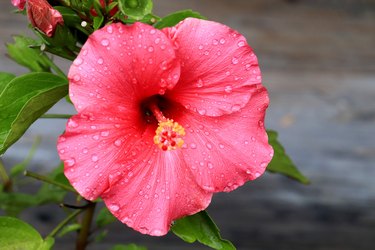
Things You'll Need
12 rotten eggs
Cheesecloth
Empty gallon jugs
Spray bottle
2 posts, each 3 feet long
2 pieces of 12-inch yarn
2 clean aluminum pie pans
hammer
2 nails
Mesh netting
Fishing line
Deer are stately creatures that have been the subject of artwork, film and literature, but they also are voracious eaters who will nibble your hibiscus plants when you aren't looking. Deer definitely have their place in nature, but it's not around your hibiscus. You can use several non-lethal methods to prevent deer from eating your hibiscus and other garden plants. Combining two or more tactics increases success exponentially.
Put Bird Feeders Away at Night
Remove bird feeders from the yard before you go to bed for the night. Deer may come into the yard at night or in the early morning and feast off the fodder you've put out for birds. When deer find a convenient food source, they return to it -- and then they may discover your hibiscus plants.
Video of the Day
Rotten Eggs Keep Deer away
Mix 12 rotten eggs into 5 gallons of water to create a pungent liquid that naturally deters the deer. Strain the liquid through cheesecloth and store it in gallon jugs. Spray the mixture onto your hibiscus plants two to three times a year.
Protect Hibiscus With Stinky Stuff
Spread another type of natural deer repellent on the soil near hibiscus plants as a supplement or alternative to your rotten-egg mixture. Soap, human hair, cayenne pepper and mothballs all emit odors that deer often will avoid. Change your natural repellent weekly so the deer don't get used to one type. Reapply natural deer repellents after heavy rains, strong winds and other weather phenomena.
Fences Make For Good Neighbors
Video of the Day
Build a fence around your property or around your hibiscus plants. Two-wire electric fences with one wire 30 inches above the ground and the other 15 inches off the ground will keep deer away.
Reuse Your Pie Tins
Sink two 3-foot posts into the ground on either side of your hibiscus plants. Poke a hole in each of two clean aluminum pie pans. Thread a piece of yarn approximately 12 inches long through the hole in each pan. Hammer a nail into the top of each post and tie the pans to the nails. The pans flash in the sunlight and moonlight, scaring deer away from your hibiscus plants.
Protect Plants With Netting
Deer-proof hibiscus by placing several yards of mesh netting over your hibiscus plants to keep the deer from eating the foliage and flowers.
Create Invisible Fencing
Locate the path that deer are using to reach your plants. If deer are entering your property through a break in trees, landscaping or fencing, string clear fishing line across the path to create an invisible fence. Deer will bump into the line, get confused, and leave your plants alone
Offer Undesirable Plants
Place plants that deer find repellent near hibiscus plants. Deer are not attracted to spicy-smelling plants, ferns and ornamental grasses. Plant daffodils, narcissus, thyme and boxwood to keep deer away.
Give Your Dog the Job
Allow your beloved dog to patrol the deer-prone area encompassing your hibiscus plants. Even the most non-aggressive, milquetoast pet is capable of creating quite a ruckus, which is remarkably effective as long as he barks when he spots the deer. These animals perceive domestic canines as deadly predators akin to wolves and coyotes. Foraging deer are highly likely to move on in search of less complicated meals once they get the idea that the dogs are permanently guarding your hibiscus plants.
Warning
Do not place cayenne-pepper extracts directly on food crops; it will affect the taste.
- Oklahoma State University Extension: Ornamental and Garden Plants: Controlling Deer Damage
- University of Vermont Extension Department of Plant and Soil Science: Deer Deterrents – Scents
- National Gardening Association: How-To Project -- Coping With Pest Deer
- National Sustainable Agriculture Information Service: Deer Control Options